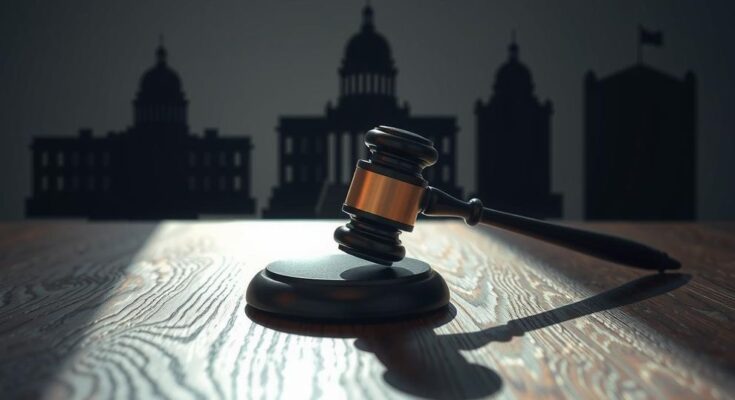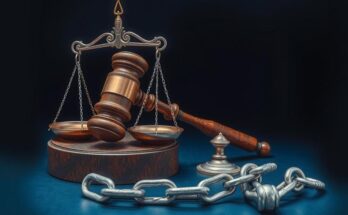Prominent Tunisian opposition figures are facing trial for plotting against state security, a move critics call politically motivated. Approximately 40 individuals, including notable politicians and activists, have been detained since 2023. Serious charges such as conspiracy and terrorist affiliation could lead to harsh penalties. The trial’s remote format raises concerns about fairness, prompting widespread criticism both domestically and internationally.
The trial of several notable Tunisian opposition figures, accused of conspiring against state security, will commence on Tuesday. Critics and human rights organizations have condemned the proceedings as politically motivated and unjust. Approximately 40 high-profile defendants, including politicians, former diplomats, and media representatives, were detained following President Kais Saied’s declaration of them as “terrorists.” Among the notable individuals accused are Jawhar Ben Mbarek, Abdelhamid Jelassi, and Issam Chebbi, all known for their vocal opposition to Saied.
The charges against these individuals include plotting against state security and allegiance to a terrorist organization, which carry severe penalties. Activists like Khayam Turki and Chaima Issa, along with businessman Kamel Eltaief and former parliament member Bochra Belhaj Hmida, are also implicated. French intellectual Bernard-Henri Levy has been named among the accused due to alleged connections with foreign entities.
In a letter from jail, Ben Mbarek criticized the judiciary as pursuing a systematic elimination of dissenting voices and denounced what he termed “judicial harassment.” The defense committee claims that the case relies on fabricated testimonies. They assert the trial will occur remotely, excluding the detained defendants from participating, a decision viewed as unfair by their families and advocates.
Ahmed Nejib Chebbi, leader of the opposition National Salvation Front, emphasized that having the defendants physically present in court is essential for a fair trial. His sentiments are echoed by others, including members of the Ennahdha party, who decry the case as devoid of legitimate basis, citing secrecy surrounding evidence and witness testimonies.
The political climate has indeed worsened, as many opposition voices have faced arbitrary detentions under various legal charges. Notable cases include that of Rached Ghannouchi, who received a 22-year prison sentence for a separate charge of conspiring against state security. The UN has called for an end to what it describes as a pattern of arbitrary arrests, urging Tunisian authorities to reassess their approach toward activists, journalists, and political figures. In response, Tunisia’s Foreign Ministry rebutted these claims as inaccurate, affirming that the individuals charged had committed public law offenses disassociated from political expression.
The forthcoming trial of key Tunisian opposition figures underscores the escalating political repression in Tunisia under President Kais Saied. Opponents failing to comply with Saied’s governance are facing serious charges, which many contend are unfounded and part of a broader effort to silence dissent. This situation has drawn international criticism and calls for justice amid fears of a deteriorating human rights environment in the country.
Original Source: jordantimes.com




